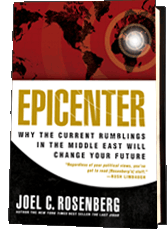Epicenter
 Epicenter is this month’s selection for the book club I belong to. I was curious to read it, because recently the subject of the Middle East has come up several times in conversations, and I wanted to learn more. This book certainly filled the bill.
Epicenter is this month’s selection for the book club I belong to. I was curious to read it, because recently the subject of the Middle East has come up several times in conversations, and I wanted to learn more. This book certainly filled the bill.
Joel Rosenberg has authored several political thrillers, none of which I’ve read — yet! In his fiction, he’s presented scenarios that bear an uncanny resemblance to future events. For instance, on the morning of 9/11 he was just finishing the final revisions of his first novel about a plane hijacked by terrorists and flown into a building. Epicenter is a nonfiction exposition of Rosenberg’s world view, and it offers perspective on the genesis of his novels, his spiritual journey from a Jewish heritage to evangelical Christianity, biblical prophecy from Ezekiel 38-39, interviews with numerous political figures, and ten headlines Rosenberg suggests we will see in the near future.
I valued this book most as a compendium of information. There is much here that is either missed or underplayed in the mainstream media. Want an alternative view of the world inside Iraq — with Iraqis as its source? Want to get a sense of the motivations and world views of leaders like Putin and Ahmadinejad as revealed by their own public declarations? Want a sustained look at the historical tensions between Israel and her neighbors? This book makes for fascinating and informative reading on these subjects.
I have a bit of a mental block about end-times exhortations. I sense an inward hand going up to deflect such discussions whenever they arise. This book isn’t really an argument about end-times, but rather an explanation of the ways various events in recent history and current events indicate that Ezekiel’s prophecy could be read as a script of sorts. In any case, it’s the script Rosenberg has heeded in writing his novels, all of which have raised eyebrows because of their accurate predictions.
Some of the interviews in the book are fascinating. Who knew that a Christian was one of Saddam Hussein’s closest advisors — one who challenged him, and lived to tell about it? Who wouldn’t love to be a fly on the wall to hear world figures reflecting on events that have shaped history? I also appreciate and admire Joel Rosenberg’s willingness to share his insights and his faith. Epicenter is a compassionate book.
It’s extremely well-researched and smoothly written, but because of its organization according to headlines, I reread the same information more than once. The same figures would be cited in different chapters to make different points, and they were reintroduced each time. I wish it had been organized in a way that would have permitted less redundancy.
The book contains an afterword, results of a study about American attitudes toward end-times prophecies, as well as a couple of appendices and a “FAQ” section. I’ve finished the main body of the text, and I’ll be browsing through the end-material between now and our book club meeting. I close Epicenter soberly, with a renewed sense of the gravity of these days. I’ll be watching the headlines, checking in at Rosenberg’s blog (which can be accessed through his website), and trying to come to terms with my own ambivalence about biblical prophecy in accordance with Jesus’ words in Luke 12:54-56. One of the points raised in this book is the propensity of modern, sophisticated intellectualism to be blind-sided by the rude facts. For instance, the world was dumb-founded when Saddam Hussein invaded Kuwait, despite his having broadcast his intentions. I don’t want to be similarly blind-sided because I’m reluctant to grapple with what the Bible may or may not have to say about the conclusion God has in mind for this great story I’m a part of.
I look forward to our book club discussion.


